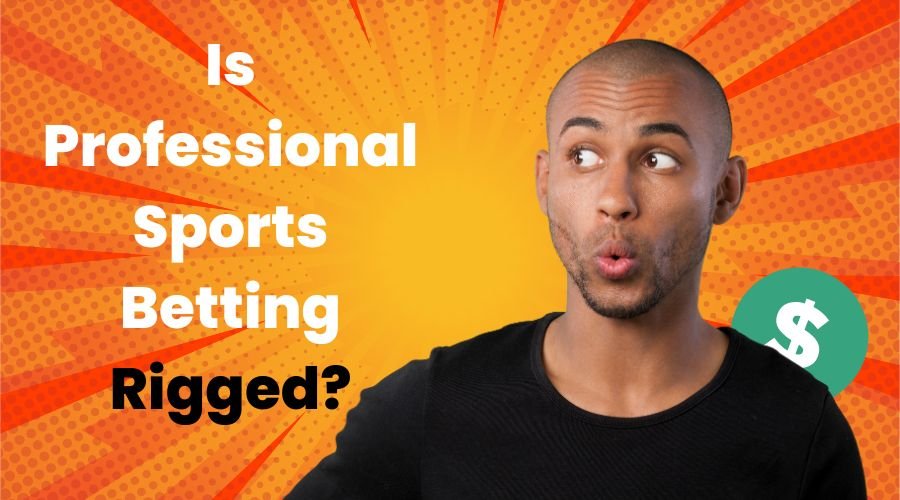Is Professional Sports Betting Rigged?

Professional sports betting has grown massively in popularity in recent years. With the legalization and expansion of sports gambling across the U.S., more and more bettors are trying their hand at wagering on games. However, some skeptics believe the games may be rigged or fixed in favor of sportsbooks and casinos. In this article, we'll examine the arguments and evidence around sports betting being rigged.

150% Bonus - Reduced Juice

$250 in Free Bets

$750 Bonus - Tons of Betting Options
Is There Proof That Professional Sports Games Are Rigged?
The question of whether professional sports leagues like the NFL, NBA, and MLB are rigged has been debated for decades. While definitive proof has been lacking, there have been some high-profile incidents that have fueled speculation.
In 1919, eight players from the Chicago White Sox were accused of intentionally losing the World Series in exchange for money from gamblers - the infamous "Black Sox" scandal. More recently, former NBA referee Tim Donaghy was caught betting on games he officiated and admitted to making calls to affect point spreads.
These types of conspiracies and manipulation undoubtedly happen from time to time. However, most experts agree it's unlikely that the major sports leagues are wholesale rigging games and Series. There's simply too much at stake in terms of revenues, brand reputation, and complex coordination across parties.
Do Sportsbooks and Casinos Have an Incentive to Rig Games?
A common argument around sports betting being rigged is that online sportsbooks and casinos have the incentive and means to fix games to maximize profits. This theory proposes that bookmakers conspire with leagues, teams, or referees to ensure the "house" wins big on large wagers.
While casinos do aim to set lines that balance action on both sides, outright match-fixing comes with huge risks. Getting caught rigging bets would lead to loss of licenses, lawsuits, and cripple the multi-billion dollar betting industry. Most analysts think sportsbooks are better off playing it straight rather than jeopardize these profits through manipulation.
Are Referees and Officials Manipulating Outcomes?
Referees hold significant power to swing games through controversial penalty calls, ejections, and more. The Tim Donaghy scandal demonstrated that some officials are willing to alter decisions for personal betting gain.
However, explicitly impacting point spreads or rigging game results would require coordination across multiple referees per game. Ongoing referee performance reviews also act as a deterrent to overt manipulation in most major leagues. Isolated incidents happen, but likely not systematic rigging directed by leagues and bookmakers.
Could Athletes Fix Games Without Detection?
Even if leagues and officials are not overtly rigging games, what about the players themselves? Theoretically, a group of players could "fix" a game through intentional poor play without leaving obvious evidence.
While individual athletes like Pete Rose have been caught betting on their own games, most experts think it's rare for enough players to coordinate throwing a game without whistleblowers or notice. Throwing games also risks athletes' careers, salaries, and reputation in their sport. With so much at stake, outright fixes by athletes seem unlikely in big leagues.
Do Bookmakers Favor Particular Teams and Players?
A case can be made that sportsbooks shade odds, lines, and payouts to favor particular outcomes. For example, books may drop odds on a popular team like the Lakers to entice more wagers on their side. This can shift where "sharp" money flows without necessarily rigging game results.
Books also closely monitor large bettors and so-called "sharps" who win often, restricting or even closing accounts of profitable players. This suggests books prefer balancing action rather than allowing systematic losses. While not outright rigging per se, these practices do indicate books favoring certain sides.
Can Betting Lines Be a Sign of Rigged Games?
Unexpected line movements and last-minute odds shifts are often seen as red flags for fixed games or insider betting. For instance, if the betting line on a NFL game suddenly moves several points just before kickoff, some interpret it as a sign of rigging or leaked info.
While suspicious line moves certainly warrant monitoring, most can be explained by late injuries, weather changes, or lopsided betting by pros and the public. Jumping to conclusions about rigging anytime lines shift can lead to tin-foil theories. Clear patterns over time, however, should raise eyebrows.
Do Sports Leagues Have Ulterior Financial Motives Around Sports Betting?
As sports betting expands, leagues have embraced gambling as a revenue source through sponsorships, data agreements, and more. The question is whether these new financial incentives could lead to attempted manipulation down the road.
The major conflict of interest lies in leagues owning data that bookmakers rely on to set odds and lines. If leagues directly profit from betting volume, they theoretically have incentive to "juice" stats and games to drive wagering activity. While no evidence yet exists of this occurring, the dynamic is concerning for betting integrity.
Key Takeaways - Is Sports Betting Potentially Rigged?
While match-fixing and manipulation occur occasionally, outright rigging of major U.S. leagues remains unlikely due to lack of evidence and huge risks involved.
Sportsbooks and casinos probably don't have incentive to systematically fix games, but may shade odds and limit sharp bettors to improve profitability.
Officials like referees hold power to influence specific games, but rigging across entire leagues would be enormously difficult.
Athletes could intentionally underperform, but actively fixing games risks their careers and reputations in most cases.
Unusual line movements and odds shifts deserve monitoring, but often have reasonable explanations beyond rigging.
As leagues financially benefit from sports betting, their ownership of data warrants watching to ensure manipulation doesn't occur.
While the risk of occasional fixes and conspiracies exists, sports betting markets largely continue to operate on legitimate competition. But with so much money now flowing into wagering, bettors should stay alert and keep an eye out for any patterns of foul play over time.
Chat 
Rules
The goal of chat is to talk sports and sports betting! Help each other by sharing picks and having a good time!
Below will not be tolerated
You can chat about most things to a certain extent. Exception is absolutely NO talking about Religion or Politics.
- There will be NO talking about others or their families
- There will be NO name calling.
- There will be NO rambling on or repeating the same thing over and over.
- There will be NO racist or sexist comments.
- There will be NO posting of other websites.
Basically treat others the way you would like to be treated.
Break the rules

- 1st warning a 24 hour ban
- 2nd warning 7 day ban
- 3rd warning a lifetime ban




